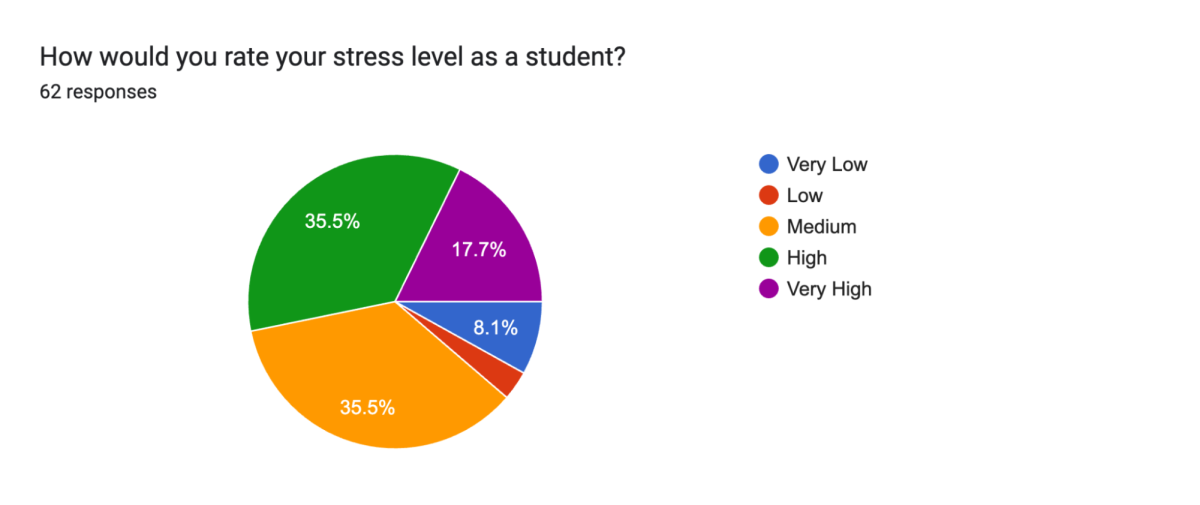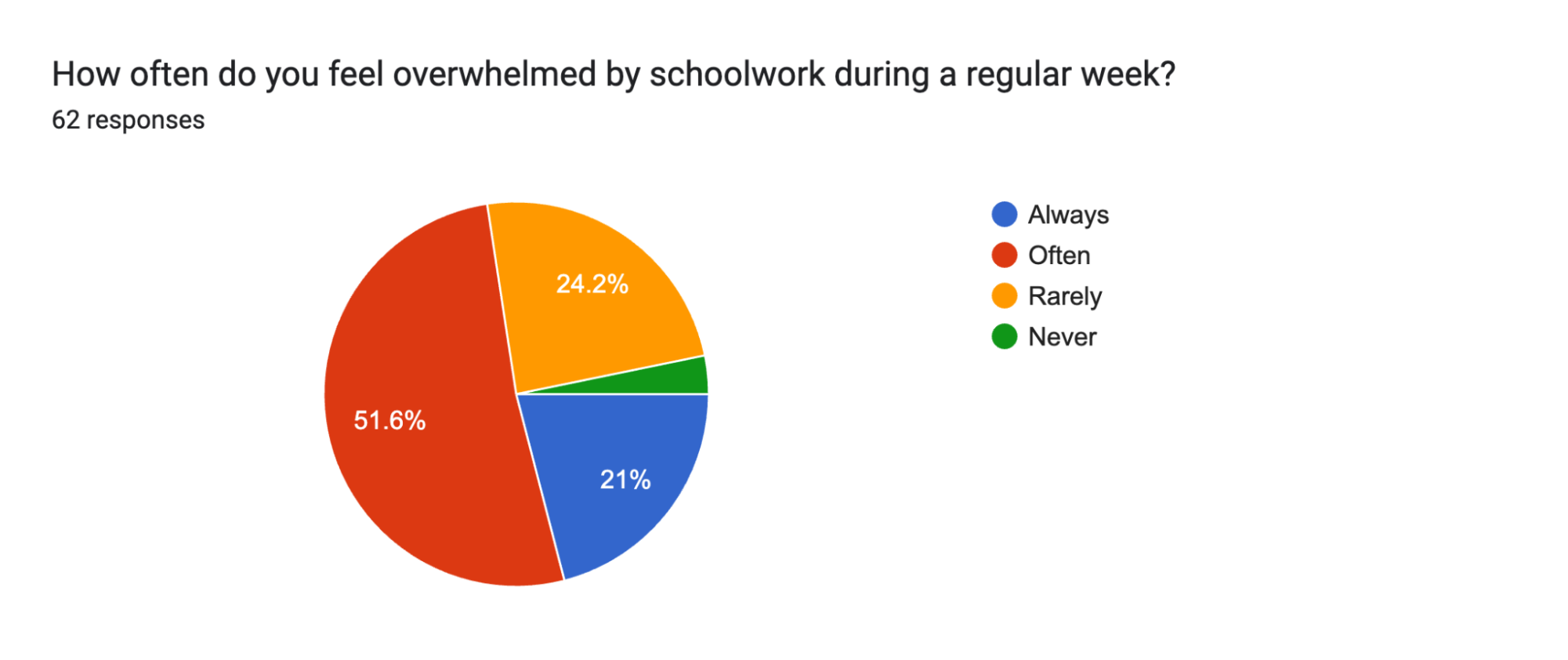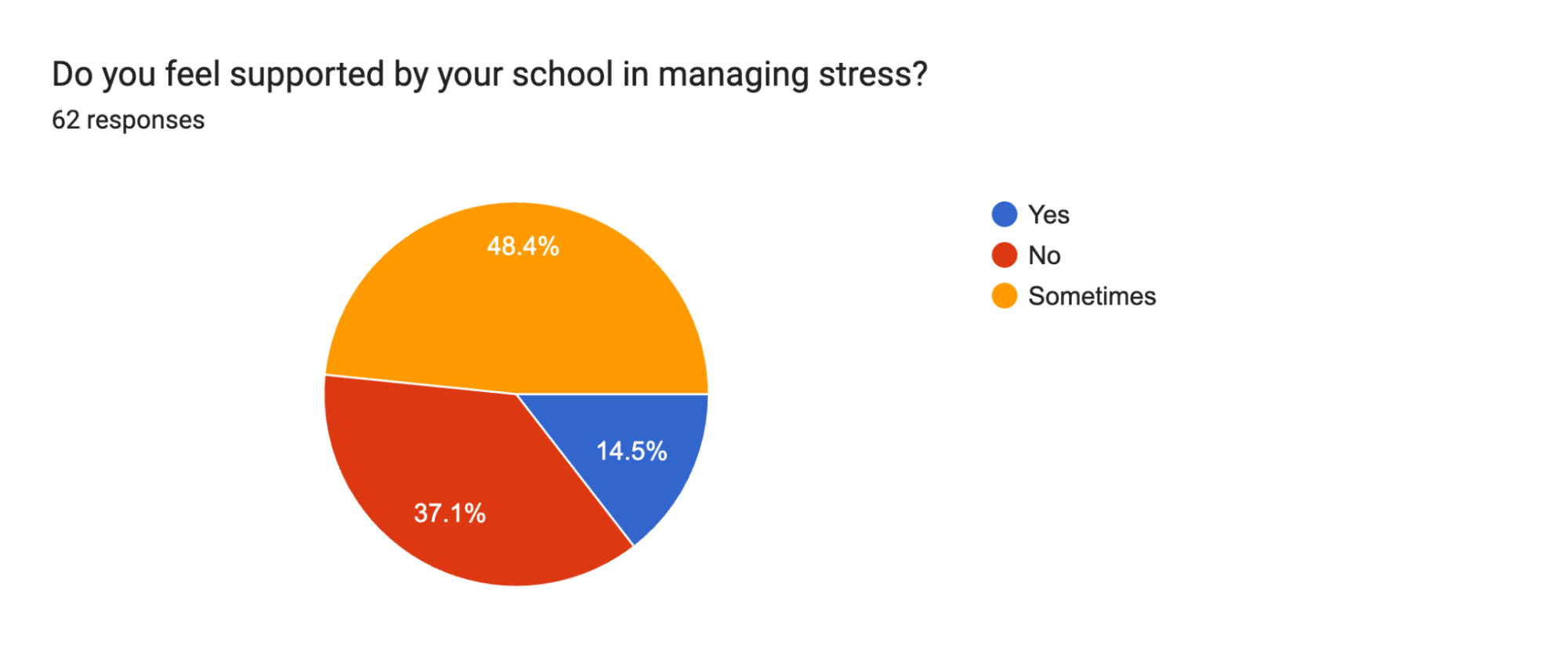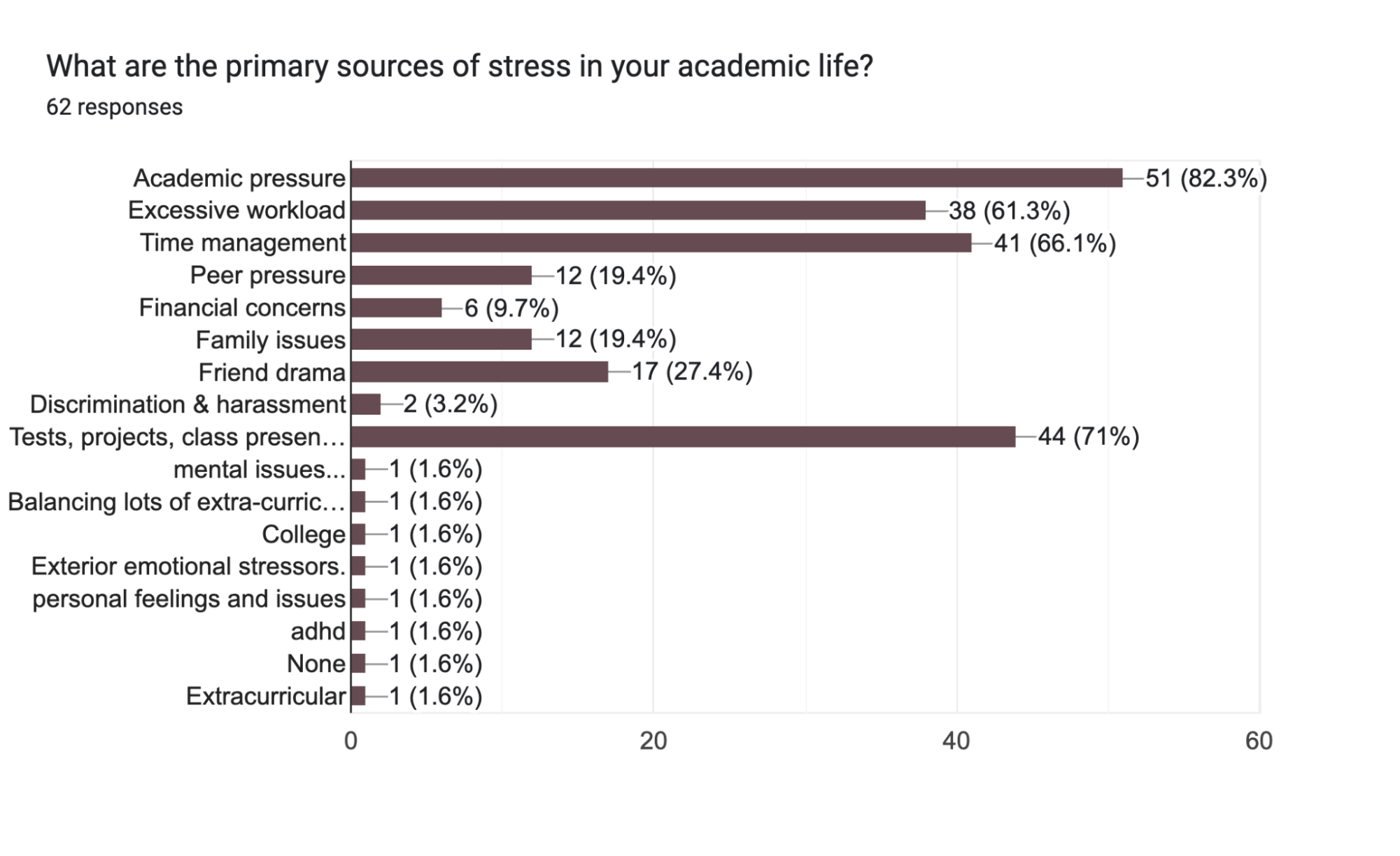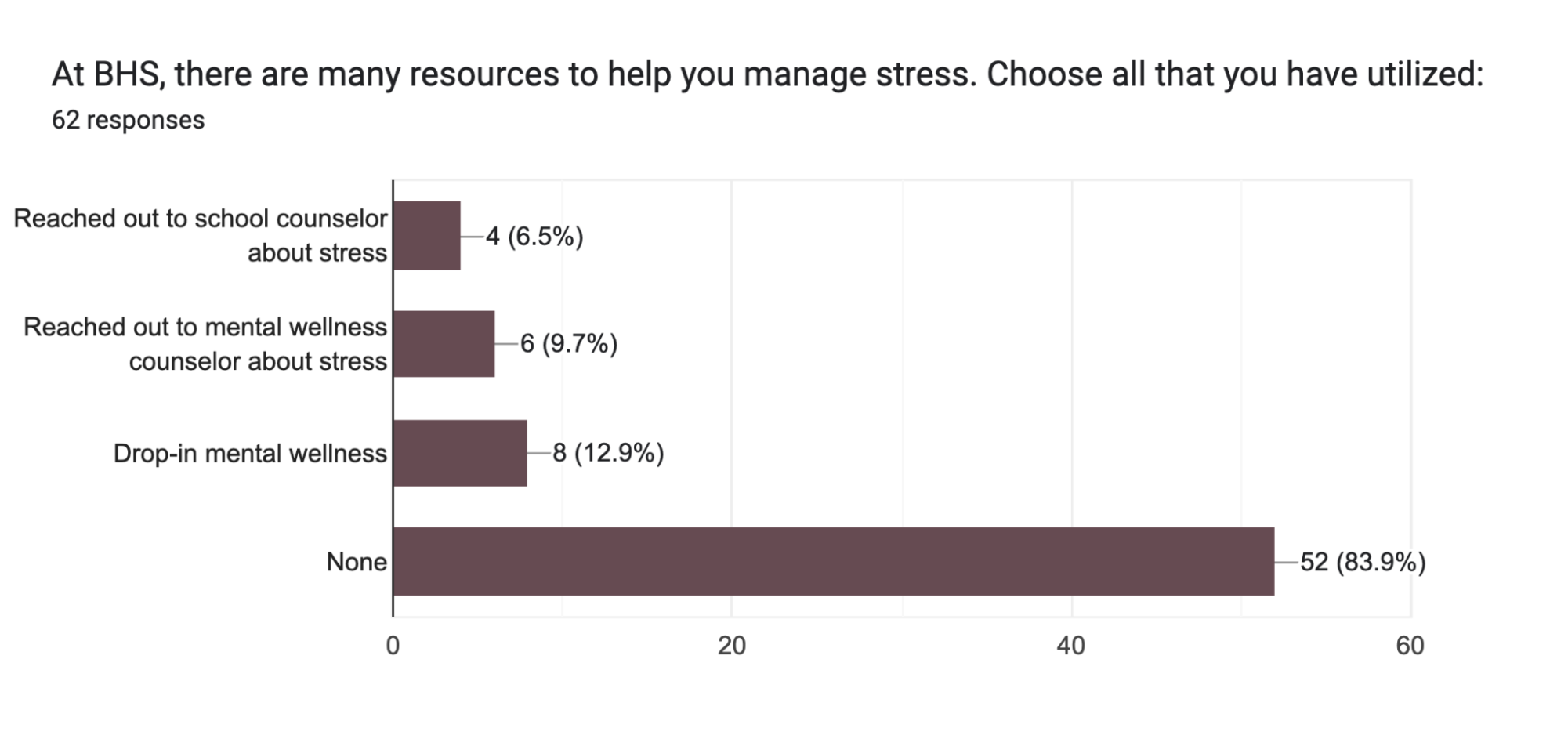The Burlingame B released an anonymous survey in April asking students about their experiences with stress. These were some of their responses:
“There is always a lot going on and never enough time or help to take care of it. I constantly feel like I’m playing catch up with something or someone in my life.”
“I feel like I’m in a rat race with my peers to get to college or to get the best grades.”
“[Some] days I’m so overwhelmed that I don’t really speak. At all. Some days I’m just tired.”
April is National Stress Awareness Month for a reason. Between studying for finals, Advanced Placement (AP) testing and college decision letters, many students struggle to manage their schedules and cope with academic pressure. In fact, 72.6% of survey respondents often or always feel overwhelmed by schoolwork, while 53.2% reported experiencing high levels of stress.
So, where does all this stress come from?
In the B’s poll, 82.3% of respondents identified academic pressure as their primary source of stress in their academic life. It was closely followed by tests, projects and presentations, time management, excessive workload and friend drama.
“The pressure comes from everywhere,” an anonymous survey respondent said. “My parents don’t try to add [to] it, the school recommends things to help, but everything still feels so important and so easy to mess up.”
In addition to rigorous academic standards, students often compare their school successes to others, creating a competitive atmosphere.
“For me at least, school itself is pretty easy even given the workload of four AP [classes],” another anonymous respondent said. “It’s much more about existential stress of performing, of never doing enough to compete with my peers, and slowly lowering my expectations for the future the more I see the things other people are doing that I’m not.”
Outside of school, students are often encouraged to participate in extracurriculars to increase their chances of getting into college, but the resulting stress can pile on top of academics and become overwhelming.
“[My extracurricular] causes [more than] 80% of my stress,” an anonymous student said. “It makes stress from school work hardly even a concern.”
Another prominent stress factor for students comes from familial expectations. 58.1% of students said pressure from family to perform well academically contributed to stress.
“[Most] of my stress is from my parents,” freshman Savannah Carranza said. “Sometimes it’s just too much to handle because they have really high expectations of [my] schoolwork. They’re always like, ‘Can’t you do better?’”
What are the side effects of high stress levels?
It’s no secret that high schoolers who face heavy workloads often also miss out on other aspects of life, but those around the Bay Area seem to get the worst of it. A staggering 87.1% of students at Burlingame said they sacrifice sleep or other activities due to academic demands. Nationally, 72.7% of high school students get less than 8 hours of sleep during weekdays (CDC).
“Sometimes [I get] a lot of sleep, [but] sometimes I’m just running on like caffeine alone,” Carranza said.
The combination of academics and extracurricular activities can cause so much stress that reducing involvement is the only way to relieve the pressure.
“If I felt less burnt out and had more time, I would be able to pursue so many other subjects I’m interested in,” an anonymous student answered. “I hate having to drop some of my passions in favor of academics.”
School can be a tough environment for students, as they are surrounded by peers that will compete against, judge and even bully them, which can impact attendance.46.8% of respondents reported missing classes due to the stress factors they face at school.
“It’s honestly easier and far less stressful to just stay home and make up the assignments at home,” an anonymous respondent said. “I can get my assignments done in a little over an hour while at home instead of having to stay at school and waste time sitting in class and having to deal with bullying.”
How do students cope with academic stress?
Despite the stress students undergo, 83.9% of students reported never using mental wellness resources at Burlingame, and 61.2% of students rarely or never participate in stress-relieving activities.
Senior Tyler Wong’s experience is an example of how developing time management skills can significantly decrease stress levels. In his first semester as a senior, Wong struggled with procrastination, which caused him unnecessary stress and anxiety over schoolwork.
“In the past, I had a tendency [to] slack off and just be lazy,” Wong said. “I used to procrastinate a lot and put things off until the last minute. It was a really tough habit to break.”
Wong has since learned to regulate his procrastination and build healthy study habits to decrease stress. To mitigate stress, he often listens to music, plays video games, writes and practices breathing exercises.
“One of the biggest hobbies I have is writing,” Wong said. “A lot of the video games I play and the music I listen to influences that and it puts me to work on my writing, which also helps me take my mind off things and puts me at ease for a little bit. Now that I’m handling things differently, the stress level has gone down from little to none at all.”
Similarly, Carranza uses her diary throughout the day as an outlet for anxious thoughts and emotions.
“I write a lot or journal to get rid of my feelings,” Carranza said. “It makes me feel so much less [anxious]. Writing and talking are my stress letter-goers.”
Carranza also sets a cutoff point for how much homework she does. Her self-imposed deadline provides more motivation to complete homework and helps reduce procrastination. Additionally, it gives her time to wind down and practice self-care for the rest of the night.
“Even if I’m not completely done, I cut myself off because I have a limit,” Carranza said. “If I continue going, it’ll drag [on] me throughout my night.”
Does counseling help with stress relief?
Seeking help from adults is often a first instinct to cope with stress. According to Wong, talking to Burlingame’s counselors has helped him decrease stress levels and provided a space for him to vent.
“Mental wellness counseling helped me a lot more than I thought,” Wong said. “[Whenever] there’s something bothering me in life, I drop in with the counselors or schedule appointments, and it does calm me down a good amount.”
The anonymous poll respondents tell a different story about student experiences with stress-managing resources. Only 14.5% of students reported feeling supported by Burlingame in managing stress.
“The advice [from the] counselors and teachers is to take less APs or put less pressure on students, but they don’t offer tools to both remain less stressed [and] compete on the level necessary to get into good colleges,” an anonymous student said.
Some students, however, have found teachers and staff members on campus whom they can confide in. For instance, Carranza often talks with Cindy Skelton, her drama teacher. This communication is a valuable resource for Carranza to find support for her stress.
“[Ms. Skelton] is just amazing, and she’s got a lot of great advice,” Carranza said. “She’s also an AVID teacher, so she helps me out with a lot of the schoolwork that has gone along with [the] mental things.”
What are ways you can minimize stress?
National Stress Awareness Month aims to raise awareness about the causes and effects of stress. Because of the pressure they are subject to at a young age, teens are often the focus of efforts to improve mental health.
Developing healthy coping mechanisms is the first step to managing academic stress. Emotional outlets such as talking, journaling, exercising and creating art have been found to be effective at reducing stress levels. Creating support groups, finding trusted adults, seeking therapy and engaging with peers also create safe environments for students to relieve stress.
“[At] school, your friends are your chosen family, and they helped me through a lot,” Carranza said. “I found really good friends that will back me up.”
As the school year nears its end, students will face various challenges including finals, maintaining grades and social pressures. Using mental health resources and practicing self-care can help students finish out the semester strong.
“Whenever you’re stressed, don’t let it get to you and tell yourself, you got this,” Wong said. “You’re not infallible, but you’re invincible. Do what you [have] to do, and you’ll be fine.”







































